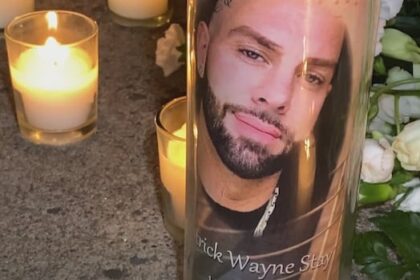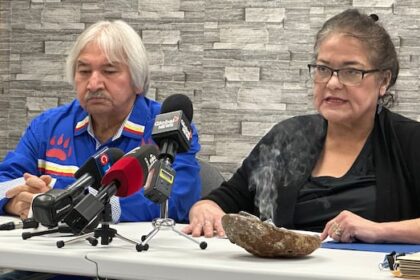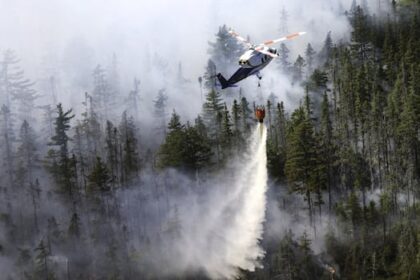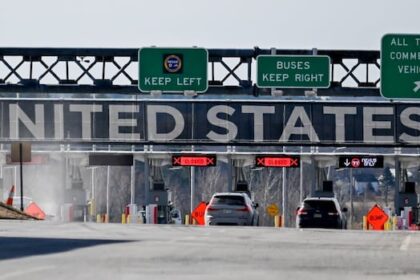As Parliament resumes with yet another Liberal government, reporters who cover the intersection of federal and Indigenous politics say the tone in Ottawa has shifted — and not just because there’s a new prime minister at the helm. On APTN’s Nation to Nation, three journalists reflected on the summer’s political mood and what it signals for the months ahead. While the Liberals remain in power, the transition from Justin Trudeau to Prime Minister Mark Carney has not gone unnoticed. Joy SpearChief-Morris, a citizen of the Kainai Blood Tribe and the 2025 CJF-CBC Indigenous Journalism Fellow, said Carney’s approach to Indigenous relations lacks the public warmth of his predecessor. “You didn’t have that same charisma that, you know, Trudeau would come in and talk with everyone and charm everybody and everyone would feel like they got their time with him,” she said. “And I’m not sure if we’re seeing that exact same relationship with Carney.” SpearChief-Morris pointed to the surprise of the Liberal win, after many Indigenous leaders had spent months preparing for a Conservative government and potential funding cuts. “I think he started off on a really good foot… And then like a week after we got Bill C-5 and it changed the entire tone of, ‘Okay, this is how it’s actually going to work here.’” Bill C-5, the One Canadian Economy Act, gives Cabinet sweeping powers to fast-track major projects like mines, highways and pipelines by bypassing established federal environmental laws if needed. A majority of Indigenous leaders spoke out against the bill, saying it was passed without proper consultation and expressed fear it would weaken their right to be consulted on projects affecting their lands. For Alessia Passafiume, an Anishinaabekwe and Parliamentary reporter with The Canadian Press, the contrast is most obvious in how Carney shows up — or doesn’t. “[Trudeau] didn’t just show up when it was to his benefit,” she said. “He would go to the AFN [Assembly of First Nations] and get a little bit yelled at by chiefs. He would take it, because that’s part of what he thought the job was.” By comparison, Carney has turned up when it is pragmatic for his own policy agenda, she said. Still, Passafiume noted one important shift: the appointment of Indigenous Services minister Patty Hajdu’s successor, Cree MP Mandy Gull-Masty. “From the conversations I’ve had with chiefs, they really respect her… It’s great to have somebody in there who knows the file so intimately.” Fraser Needham, a correspondent for APTN in Ottawa, said the presence of the NDP—or lack of it—is another major difference shaping this session. With just seven MPs, the party has lost official status and, with it, regular seats at committee and question period. But Needham argued this could be a political reset. “I think they were under a lot of difficult challenges to define themselves under Trudeau… They joined the coalition, basically because they did get some things — the pharmacare and dental plan — out of it,” he said. “I think they’ll have a robust leadership convention… and it’ll be easier for them to move on some of the social issues.” What’s less clear, he added, is whether the Carney government understands the cost of cutting out its former allies. “With C-5… he’s kind of snubbed both the Bloc and the NDP. And I think they’re kind of saying that they don’t have any goodwill at this government.” What’s at stake for Indigenous communities in Carney’s first budget? Carney has cautioned that his first federal budget—set to drop Nov. 4, will be an austerity budget. A leaked internal government email from July confirmed that Indigenous Services Canada (ISC), like other departments, has been asked to cut planned spending by up to 15 per cent over three years. But when Carney faced First Nations leaders behind closed doors at a summit on July 11, he framed it differently. “This government will continue to deliver the services for which we are responsible. Okay? We have to do more, not less,” Carney told chiefs when asked about the looming cuts. Journalists covering the Indigenous beat will be watching that promise closely. “I think it’s not a question of what’s going to be cut,” said SpearChief-Morris. “Indigenous Services Canada is going to be losing over the next few years because of sunsetting funding from the Trudeau government. “So there’s a lot of concerns as to how that’s going to translate into jobs, into what services are available and how those services are going to be distributed.” SpearChief-Morris will also be tracking whether the Assembly of First Nations (AFN) receives any portion of its massive infrastructure ask. In its pre-budget submission, the AFN, an organization that represents more than 600 First Nations in Canada, requested nearly $363 billion over the next several years to fix homes, schools, water systems, roads, and other essential projects. Passafiume said she’ll be watching child welfare reform. In 2024, a $47.8 billion child welfare compensation deal—criticized by the First Nations Child and Family Caring Society—was voted down by most First Nations outside Ontario. While chiefs in Ontario signed a separate agreement, others pushed for new negotiations and a stronger deal. But to date, no national plan has been costed into a federal budget. “It, according to Cindy Blackstock, was magical thinking that it existed,” said Passafiume. “So I’m curious to see if that would be talked about in the budget at all, or if it would just be the Ontario agreement in there. It’s a big number and I don’t think that we’re going to see that kind of investment in child welfare in a year when Carney wants all of his ministers to find savings.” Policing, audits, and land rights will shape the fall session SpearChief-Morris said she’ll also be tracking whether calls for policing reform gain traction in the budget. At the AFN’s December 2024 Special Chiefs Assembly, leaders called for urgent investment in First Nations policing after nine Indigenous people died in the span of a single month. “We’ve seen no action on that,” said SpearChief-Morris. “And so I’m interested to see, you know, where do those calls go? And where does a national inquiry fit into this budget?” Passafiume will be watching fallout from a forensic audit of the Federation of Sovereign Indigenous Nations (FSIN), conducted by KPMG on behalf of ISC. The audit flagged over $34 million in “questionable” or “unsupported” spending between April 2019 and March 2024. “There was $34 million in spending that KPMG—a consultant firm—called into question,” she said. “The FSIN has come out pretty much saying that if you were to criticize them, you’re a right wing actor who’s not acting in good faith. But community members really want answers as to what happened—if it was an accounting problem or just not filling out a form, they want to know. And if it’s something more serious, it should be brought to light. So I’m following that pretty closely.” APTN’s Fraser Needham is tracking a key legal case that could determine how Free, Prior and Informed Consent (FPIC) is applied in future resource development projects. In 2024, the Canadian Nuclear Safety Commission approved a nuclear waste disposal facility on unceded Algonquin territory near the Ottawa River, Kitchi Zibi in Algonquin. Kebaowek First Nation challenged the decision in court. Earlier this year, a federal court found that Canadian Nuclear Laboratories (CNL) had not fulfilled its duty to consult and had failed to protect species at risk. CNL has appealed both rulings. The first of those appeals was heard Wednesday at the Federal Court of Appeal in Ottawa. “About 50 people showed up outside the Federal Court of Appeal to show their support for Kebaowek,” he said. “This included Indigenous people, environmental groups and Bloc Quebecois and NDP politicians. They all spoke about the fact that CNL and the federal government need to follow their United Nations Declaration on the Rights of Indigenous People obligations. “The hearing lasted one day and the court of appeal has reserved its decision.” Nation to Nation is APTN News’ political show, airing every Thursday. Continue Reading
Reconciliation, rebranded: What journalists covering the Nation to Nation beat are watching this fall session
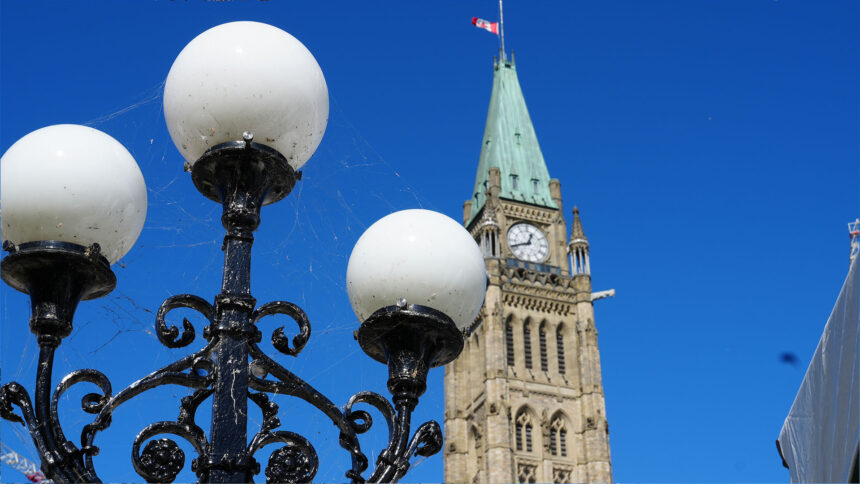
Leave a Comment







